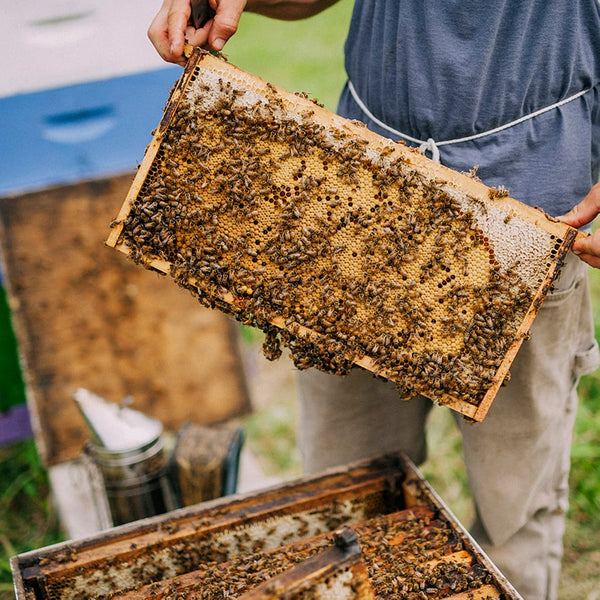
Honey Facts
-
For honey to be classified as “raw” it needs to meet a few criteria.
Essentially, raw honey has not been pasteurized, heated or fine filtered. The honey in Wai Meli jars is as natural as it is when the bees produced it in their hives. Processed (store brand) honey has been pasteurized using high temperatures (at least 63 degrees C) and is then fine-filtered which removes most of the pollen and other elements naturally found in honey. This process significantly reduces both the flavor and beneficial properties of the honey. At Wai Meli, we want to make sure our honey is as healthy, natural, and flavorful as possible.
Furthermore, most of the honey you see in the supermarkets are a combination of honeys produced by many different beekeepers in many different places then blended. All our honey is unblended and comes from our own hives and bees.
Raw Honey is the way honey should be.
-
As long as the honey was harvested properly and stored correctly not only will honey never spoil, it’s been found in ancient Egyptian tombs.
-
By moving hives to different regions which contain specific floral sources, the bees produce unique honey varietals. Due to uncontrollable circumstances like rain, sun, wind and plant growth, the taste, viscosity and color of the honey will change from year to year.
-
The color of honey is totally dependent on the flowers and fauna that the bees have been interacting with.
-
Pure, raw honey has a natural tendency to crystallize over time with no effect on the honey other than color and texture. The rate of crystallization depends on many factors, including the type of pollen , and nectar the bees were foraging on. At its core, crystallization happens because honey contains more than 70% simple sugars and less than 20% water. On our farm we do not jar anything that is above 17.5% water. Crystalization is also dependent on the glucose and fructose ratios. The more glucose a honey has the quicker it crystalizes. This means that the water in honey contains more simple sugars than it can naturally hold. Crystallized honey is not “bad,” in fact, some people prefer it, as it’s easier to spread on toast as it doesn’t run off your knife! Not to mention the crystallization of honey preserves its flavor and quality.
-
It is practically a daily occurrence on the farm.
-
All raw honeys have different viscosities depending on the floral source. None of our honey is heated.
-
The honey is harvested by hand and hand placed on the truck on a pallet. The pallet is then forklifted off the truck once at the base yard and placed into the processing facility.
-
It's been almost ten years.
-
Wai Meli has 100 hives!
-
Yes! We don’t heat or fine filter our honey prior to bottling. The raw honey contains pollen and all the amino acids, enzymes and minerals that the bees worked so hard to add! It is important to note that raw honey should never be fed to infants under 1 year old.
-
Yes. We manage our hives organically without the use of chemicals or chemical pesticides on certified organic lands, or organic wild forest lands.
-
No we do not give our bees antibiotics. We keep our bees immune systems strong by providing a healthy environment containing an abundance of food. This creates a healthy gut microbiome in the honey bees that promotes the growth of beneficial probiotics.
-
Our honey does not need to be refrigerated. It is best kept at room temperature, so long as you do not experience extreme temperature fluctuations or extreme heat. On the counter is our preference. Honey will never go bad, so long as you store it properly. Using a clean spoon each time and avoiding any water getting into your jar will ensure it retains its optimal quality.
-
No, raw honey does not need to be refrigerated. It is best kept on the counter at room temperature.
-
We often say our favorite way is by the spoonful! Honey can be used in place of other sweeteners for nearly any recipe. The best way to enjoy our raw honey is to eat it!
-
The nutritive benefits of honey are best retained by minimizing or eliminating exposure to heat. That being said, baking with honey or heating honey at high temperature will decrease the nutritive benefits as the enzymes and amino acids that are contained in raw honey are sensitive to heat. Traditional Ayurvedic wisdom suggests that heating honey creates a sticky substance in the body that is difficult to digest. We suggest gently warming honey over low heat if needed, or keeping it room temperature for maximum nutritional benefits.
Our Honey
Our Farm
Storing & Eating
Stay Connected

Stay Connected
Join our mailing list today for exclusive content and specials.

